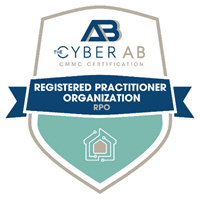Achieving CMMC Certification Without IT Staff
Achieving CMMC Certification Without IT Staff: A Comprehensive Guide
Cybersecurity Maturity Model Certification (CMMC) is a critical requirement for businesses dealing with Controlled Unclassified Information (CUI) for the Department of Defense (DoD). While it offers a structured framework for protecting sensitive data, achieving CMMC certification is inherently technical and requires significant expertise.
For small businesses without dedicated IT staff—or those whose teams lack experience with technical standards—preparing for CMMC compliance can seem daunting. However, solutions are available, even for companies with minimal technical resources.

Common IT Challenges in Preparing for CMMC
For companies without a robust IT team, preparing for CMMC can highlight several challenges:
-
- Technical Complexity: The majority of CMMC requirements involve intricate technical controls, such as access control, data encryption, and system monitoring.
- Organizational Controls: Non-technical measures like employee training, physical security, and visitor management also play a significant role.
To meet these requirements, businesses must ensure compliance wherever CUI is handled, whether on internal networks, cloud platforms, or third-party systems.
Upgrading infrastructure to meet these demands often requires specialized expertise and investment.
Can a Business Achieve CMMC Certification Without IT Staff?
Yes, even companies with minimal IT resources can achieve CMMC compliance. While all 110 controls across technical and organizational categories must be met, businesses can explore alternative approaches to bridge gaps in expertise. These include outsourcing to external experts or leveraging specialized turnkey solutions.
What Expertise Should an IT Team Have for CMMC Preparation?
An ideal in-house IT team preparing for CMMC should possess:
-
- CMMC Knowledge: Understanding of CMMC levels, CUI protection, and relevant compliance frameworks.
- Cybersecurity Expertise: Proficiency in risk assessments, encryption, and implementing best practices.
- Regulatory Compliance Knowledge: Familiarity with NIST 800-171 and DFARS 7012 requirements.
- Technical Implementation Skills: Ability to manage servers, networks, cloud environments, and SIEM tools.
- Organizational Skills: Developing and executing incident response plans, conducting employee training, and maintaining security documentation.
For many small businesses, their IT teams are often stretched thin maintaining current systems, making it challenging to dedicate the time and effort required for CMMC preparation.
CMMC With No IT Staff
Description: One thing is very apparent with CMMC, it is very technical and will require a high degree of technical skill to do it properly. But, many small businesses don’t have a dedicated IT staff, or their IT team has no hands-on experience with meeting technical standards. How can a business with limited or no IT staff achieve CMMC certification? In this session, our team explains the technical resources and skills needed to prepare for a CMMC certification.
Key Technical Decisions for Independent CMMC Preparation
Companies must address critical technical considerations when preparing for CMMC:
-
- On-Premises vs. Cloud-Based Solutions: Should they host CUI internally or opt for a cloud environment?
- Scope of Coverage: Should the entire network or only specific segments handle CUI?
- Monitoring Needs: What tools and processes will be used for continuous monitoring and anomaly detection?
Alternative Approaches for Companies Without IT Resources
Hire a Managed Service Provider (MSP):
MSPs can manage and monitor IT infrastructure, aligning it with CMMC requirements. They offer expertise, scalability, and cost-efficiency.
Engage Consultants or Contractors:
Cybersecurity experts can provide short-term support to assess, upgrade, and implement necessary measures.
Invest in Staff Training:
Existing non-IT staff can undergo cybersecurity training to build internal knowledge and foster a security-conscious culture.
Leverage Turnkey Solutions:
Pre-configured systems tailored to CMMC requirements can simplify compliance. These solutions often include automated tools for monitoring, encryption, and reporting.
Why Consider an MSP for CMMC Preparation?
Hiring an MSP can provide numerous advantages, including:
-
- Expertise: Deep knowledge of CMMC requirements.
- Cost-Efficiency: Avoid the expense of building an in-house team.
- Continuous Monitoring: Proactive oversight of IT systems.
- Scalability: Flexible services tailored to business needs.
- Access to Advanced Tools: Utilization of cutting-edge cybersecurity technologies.
While MSPs Offer Numerous Benefits, There Are Also Potential Risks. Can You Shed Light on This?
-
- Finding an MSP with the right expertise.
- Becoming over-reliant on the MSP and not learning CMMC for yourself.
- Potential breaches if MSP security isn’t robust, with the company remaining liable for shortcomings.
- Unexpected fees or costs for CMMC-related services.
- Ensuring compliance. The MSP will likely need to be CMMC certified and any cloud systems they are using need to be FEDRAMP-moderate compliant.
What Kinds of Support and Services Can an MSP Provide?
They can either upgrade your existing environment or they can provide an environment to host your CUI on their premises.
In either case, they would likely be responsible for maintaining and monitoring your systems remotely and providing necessary patches and updates as needed.
What Key Factors Should a Business Consider When Choosing The Right MSP Partner?
-
- Is the MSP familiar with NIST 800-171, DFARS 7012, and CMMC?
- How is data protected if it is stored in the MSP’s environment? Are they using encryption?
- Is your data separated from other clients’ data?
- Does the MSP enforce Multi-Factor Authentication (MFA) for critical access points?
- Does the MSP have a Security Operation Center (SOC) or Security Information and Event Management (SIEM)?
- How does the MSP team access your environment? Are shared accounts used? Is there an audit trail?
- Does the MSP offer Incident Response support with an Incident Response Plan (IRP)? How often is it tested?
- Does the MSP outsource any services to subcontractors?
Turnkey Solutions for CMMC Compliance
Pre-Packaged Setup:
Offers pre-configured components tailored for CMMC, eliminating the need to assemble disparate tools.
Quick Implementation:
Designed for rapid deployment across an organization’s infrastructure.
Standardized Protocols:
Provides set processes aligned with CMMC requirements, from access control to incident response.
Training & Support:
Includes essential training materials, documentation, and ongoing vendor assistance.
Automated Monitoring:
Features continuous threat detection and regular updates to stay current with CMMC standards.
Integrated Defense Tools:
Combines multiple security tools, such as firewalls and encryption, for comprehensive protection.
Compliance Reporting:
It comes with built-in tools for validating compliance and preparing for CMMC assessments.
What are Some Key Considerations When Selecting a Turnkey Solution for CUI and CMMC?
Storage:
Where is CUI stored and is it isolated?
Encryption:
Protection measures for data in transit and at rest.
Access & Backup:
Role-based permissions and backup/recovery protocols.
Monitoring:
Real-time alerts for security incidents.
Updates & Configuration:
Patch management and default security settings.
Response & Analysis:
Automated actions for incidents and forensic capabilities.
CMMC & Updates:
Alignment with CMMC and update frequency.
Compliance:
Third-party security verifications (FEDRAMP, CMMC-future).
Support:
Training and assistance are provided by the vendor.
Best Practices for Selecting a Turnkey Solution
Due Diligence:
Vet providers for CMMC expertise and compliance with NIST and DFARS standards.
Pilot Testing:
Test solutions in a controlled environment before full-scale adoption.
Stakeholder Engagement:
Involve key personnel to ensure alignment with organizational needs.
Regular Reviews:
Periodically assess the solution’s performance and updates.
The CORE Vault:
A Turnkey Solution for CMMC
The CORE Vault is a tailored solution designed for businesses needing a streamlined path to CMMC compliance.
Purpose:
Designed for contractors working with the Department of Defense (DoD) to ensure they meet advanced cybersecurity protections.
Compliance Standards:
Helps contractors comply with DFARS by meeting the requirements of NIST SP 800-171. It also prepares contractors for the upcoming Cybersecurity Maturity Model Certification (CMMC 2.0) requirements.
Solution Features:
Data Segregation: Allows contractors to separate government data from their primary network. This data is then accessed through a secure, cloud-based environment.
Managed by Experts:
The cloud-based environment is managed and monitored by cybersecurity experts from CORE.
Comprehensive Support:
CORE Vault provides support to achieve full compliance with non-technical cybersecurity requirements. This includes assistance with system security plans and other mandatory policies.
Efficiency:
Some contractors have achieved their maximum DoD-required SPRS score within 30 days using CORE Vault.
Final Thoughts
CMMC compliance is achievable for businesses of all sizes, even those without dedicated IT teams. By leveraging MSPs, consultants, or turnkey solutions like the CORE Vault, companies can effectively navigate the complexities of cybersecurity standards. For more information about our CMMC programs for small businesses, contact us at info@thecoresolution.com.
Let us help you protect your business and meet DoD requirements efficiently and affordably.
About CORE Vault for NIST CMMC
Everything you need for NIST/CMMC in one cloud-based solution. The CORE Vault CUI Enclave and Consulting Services.
If you contract with the Department of Defense, you require advanced cybersecurity protections. To comply with DFARS, you need to meet the requirements of NIST SP 800-171. Soon, DoD contractors will also need to meet the requirements of Cybersecurity Maturity Model Certification (CMMC 2.0). However most contractors don’t have the resources to overhaul their entire network for compliance. With CORE Vault, you don’t have to.
With CORE Vault, you can separate government data from your network and access it through a secure, cloud-based environment managed by our cyber experts.
CORE Vault also includes the support needed to reach full compliance with the non-technical cybersecurity requirements, such as your system security plan and required policies.
We’ve seen contractors achieve their maximum DoD-required SPRS score in 30 days.

Core Business Solutions, established in 2000, is a Registered Practitioner Organization through the Cyber AB and has been providing consulting and technical solutions for NIST/CMMC for over 5 years. Rick Krick is the Director of Security Solutions for Core Business Solutions and directs our Cybersecurity Services solutions including CMMC. Rick has over 25 years of experience in Management System implementations, software development, IT services, and certifications.

